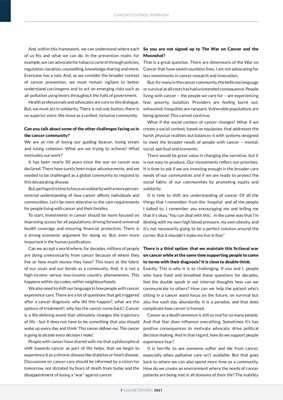
CANCER CONTROL INTERVIEW
7 CANCER CONTROL 2021
And, within this framework, we can understand where each
of us fits and what we can do. In the prevention realm, for
example, we can advocate for tobacco control through policies,
regulation, taxation, counselling, knowledge sharing and more.
Everyone has a role. And, as we consider the broader context
of cancer prevention, we must remain vigilant to better
understand carcinogens and to act on emerging risks such as
air pollution using levers throughout the halls of government.
Health professionals and advocates are core to this dialogue.
But, we must act in solidarity. There is not one button, there is
no superior voice. We move as a unified, inclusive community.
Can you talk about some of the other challenges facing us in
the cancer community?
We are at risk of losing our guiding beacon, losing steam
and losing cohesion. What are we trying to achieve? What
motivates our work?
It has been nearly 50 years since the war on cancer was
declared. There have surely been major advancements, and we
needed to be challenged as a global community to respond to
this devastating disease.
But, perhaps it is time to focus on solidarity with a more personcentred understanding of how cancer affects individuals and
communities. Let's be more attentive to the care requirements
for people living with cancer and their families.
To start, investments in cancer should be more focused on
improving access for all populations, driving forward universal
health coverage and ensuring financial protection. There is
a strong economic argument for doing so. But, even more
important is the human justification.
Can we accept a world where, for decades, millions of people
are dying unnecessarily from cancer because of where they
live or how much money they have? This tears at the fabric
of our souls and our bonds as a community. And, it is not a
high-income versus low-income country phenomenon. This
happens within zip codes, within neighbourhoods.
We also need to shift our language in how people with cancer
experience care. There are a lot of questions that get triggered
after a cancer diagnosis: why did this happen?, what are the
options of treatment?, why has the cancer come back?. Cancer
is a life-defining event that ultimately changes the trajectory
of life - but it does not have to be something that you should
wake up every day and think 'This cancer defines me. This cancer
is going to dictate every decision I make'.
People with cancer have shared with me that a philosophical
shift towards cancer as part of life helps, that we begin to
experience it as a chronic disease like diabetes or heart disease.
Discussions on cancer care should be informed by a vision for
tomorrow, not dictated by fears of death from today and the
disappointment of losing a "war" against cancer.
So you are not signed up to The War on Cancer and the
Moonshot?
That is a great question. There are dimensions of the War on
Cancer that have saved countless lives. I am not advocating for
less investments in cancer research and innovation.
But, for many in the cancer community, the bellicose language
or survival at all costs has had unintended consequence. People
living with cancer - the people we care for - are experiencing
fear, poverty, isolation. Providers are feeling burnt out,
exhausted. Inequities are rampant. Vulnerable populations are
being ignored. This cannot continue.
What if the social context of cancer changes? What if we
create a social context, based on equipoise, that addresses the
harsh physical realities but balances it with systems designed
to meet the broader needs of people with cancer - mental,
social, spiritual and economic.
There would be great value in changing the narrative, but it
is not easy to produce. Our investments reflect our priorities.
It is time to ask if we are investing enough in the broader care
needs of our communities and if we are ready to protect the
social fabric of our communities by promoting equity and
solidarity.
It is time to shift are understanding of cancer. Of all the
things that I remember, from the hospital and all the people
I talked to, I remember you encouraging me and telling me
that it's okay, 'You can deal with this', in the same way that I'm
dealing with my own high blood pressure, my own obesity, and
it's not necessarily going to be a perfect solution around the
corner. But it shouldn't make me live in fear."
There is a third option: that we maintain this fictional war
on cancer while at the same time supporting people to come
to terms with their diagnosis? It is close to double think.
Exactly. This is why it is so challenging. If you and I, people
who have lived and breathed these questions for decades,
feel the double speak in our internal thoughts how can we
communicate to others? How can we help the patient who's
sitting in a cancer ward focus on the future, on survival but
also live each day abundantly. It is a paradox, and that does
complicate how cancer is framed.
Cancer as a death sentence is still so real for so many people.
And that fear does influence everything. Sometimes it's has
positive consequences to motivate advocate, drive political
decision making. And in that regard, how do we support people
experience fear?
It is horrific to see someone suffer and die from cancer,
especially when palliative care isn't available. But that goes
back to where we can also spend more time as a community.
How do we create an environment where the needs of cancer
patients are being met in all domains of their life? The inability